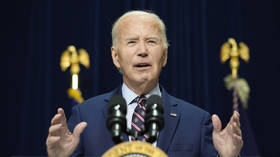London trading could be driven by advance inside knowledge of official data – report

An analysis of official trading data suggests some London-based investors may be trading with advanced knowledge of sensitive economic reports before they are released to public.
A report prepared for the Wall Street Journal (WSJ) by Alexander Kurov, an associate professor of finance at West Virginia University, suggests City investors trade using the confidential economic data in breach of regulations.
From April 2011 to December 2016, UK government-bond futures correctly predicted market fluctuations that later occurred when economic data was made available to the public.
The report found futures frequently move sharply in the 24 hours before confidential information is released to the public.
According to Kurov, this may indicate that some investors use access to official statistics to gain from the advanced knowledge of financial trends.
"Based on what I see in the data in this case, it is very unlikely that we are looking at a random pattern," Kurov told the WSJ.
The policy of early distribution of economic data to selected individuals and agencies seems to be the primary reason behind these suspicious market fluctuations, as it significantly increases the risk of leaks of financial statistics to investors.
Hetan Shah, an executive director of the Royal Statistical Society, says: "The more pre-release access you have, the more likely it is that these things are going to be leaked."
For example, UK unemployment data was distributed amongst 118 people ahead of the official release, according to the Office for National Statistics (ONS).
The ONS, which compiles the official statistics in question, highlighted that it takes any unauthorized disclosure of economic data “extremely seriously.”
However, in 2010 the government rejected a proposal by the UK Statistics Authority, an independent watchdog, to cut the maximum period of the pre-release of sensitive data to three hours in order to minimize leaks.
Former Bank of England Deputy Governor Charles Bean also believes there is a noticeable "laxity in compliance" with pre-release confidentiality rules.
In a report on economic statistics, Bean also suggested that the British government should limit the preliminary access to an “absolute minimum.”
The restrictions on pre-release access is generally supported by the financial community, as it would increase accountability and transparency of the industry.
"People watching the markets just had a feeling that something was going on, that markets were drifting into the number in a way that looked as though somebody, somewhere, knew it already," said Kevin Rodgers, Deutsche Bank's former chief foreign exchange trader.














